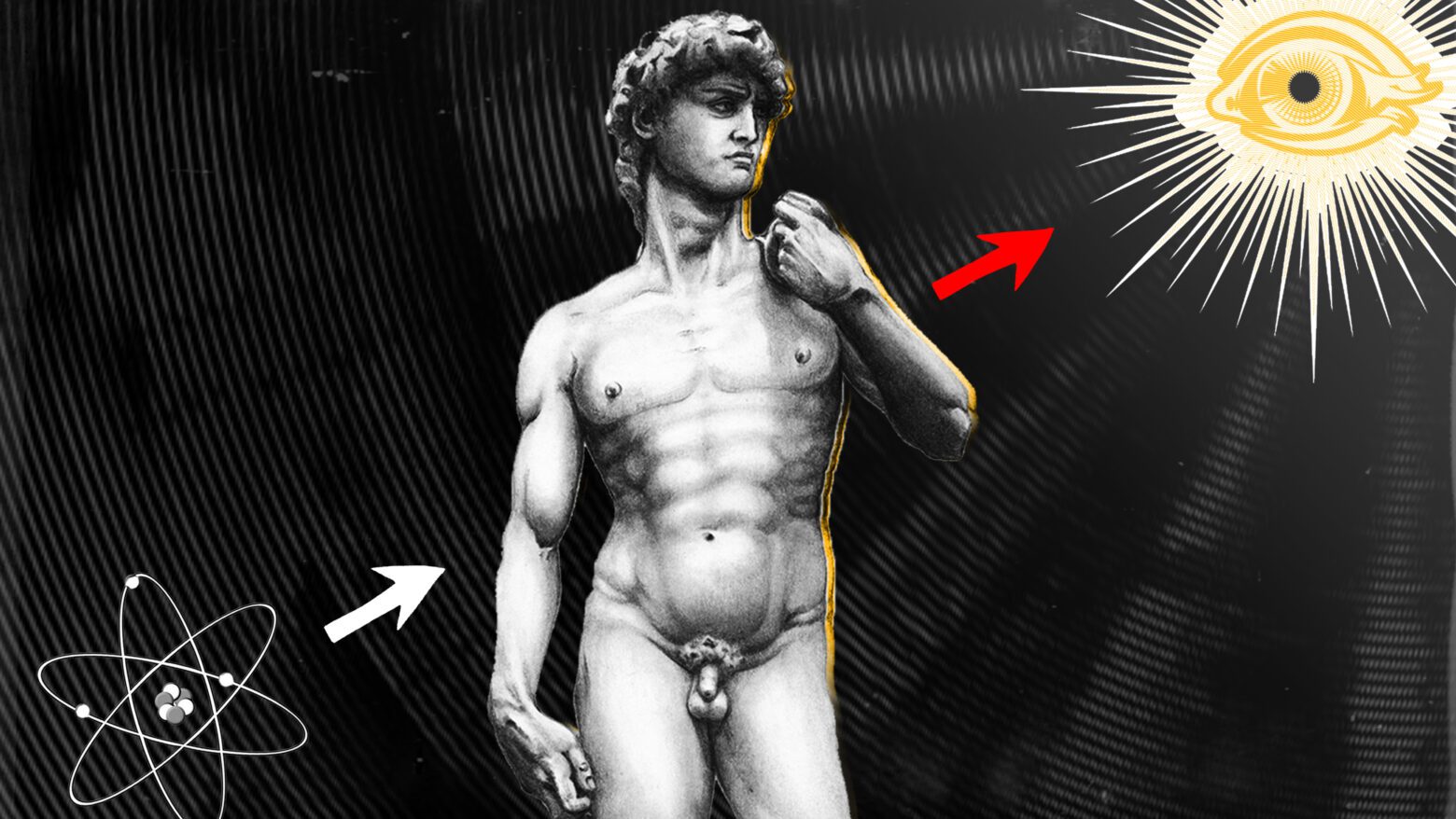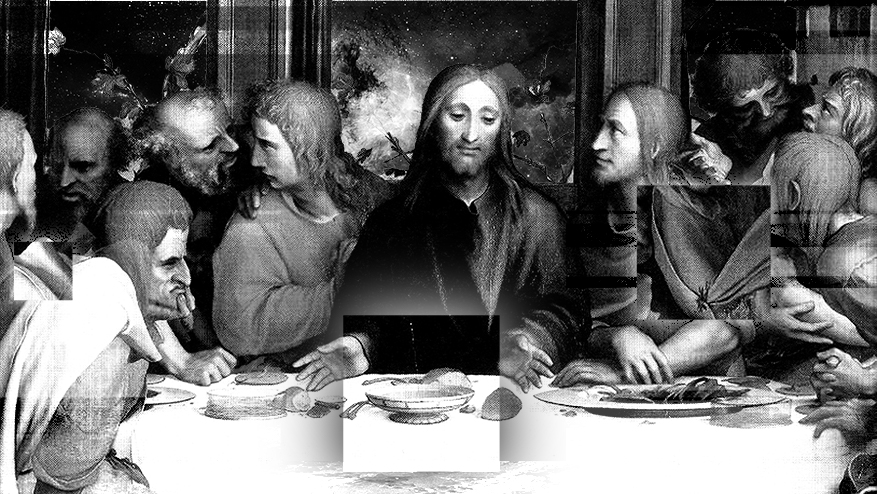What is it that breathes fire into the equations and makes a universe for them to describe?
Stephen Hawking, A Brief History of Time
Why is there something rather than nothing? Why has matter evolved into life and life into culture? Is there any meaning to existence?
Or is it all just blind chance? A cosmic roll of the dice without rhyme or reason? Perhaps the very idea of ‘meaning’ is a human invention, an anaesthetic against the arbitrariness of existence?
Perhaps…
But there is, in fact, a case to be made that existence and our part in it are not only not arbitrary, but infused with meaning. And that the evolution of the universe is a purposeful process moving in a clear direction.
(You can watch the film version of this essay on YouTube.)
Ken Wilber x Nikos Kazantzakis
To make this case, I’ll refer to the work of two modern geniuses who have each spotted the same deep patterns of existence. One of them is philosopher extraordinaire, Ken Wilber. The other is the Greek author Nikos Kazantzakis.
By superimposing their views, we get both a scientific and a poetical expression of the same core insight. Namely, that evolution is God waking up.
But let’s not get ahead of ourselves. Let’s start simple.
Evolution
What is evolution?
In On the Origin of Species, Darwin speaks of ‘descent with modification’. In Douglas Futuyma’s definition,
[biological evolution] is change in the properties of groups of organisms over the course of generations…
Douglas Futuyma, Evolution
But of course, evolution is not limited to organic life. The evolution of life forms is but a special case of a much larger process. That is, the evolution of the universe as a whole. A flow of ‘descent with modification’ from energy, to matter, to life, and beyond.
Kazantzakis gives us a glimpse of this cosmic unfolding. A glimpse, as it were, from the point of view of evolution itself. He writes:
I recall an endless desert of infinite and flaming matter. I am burning! I pass through immeasurable, unorganized time, completely alone, despairing, crying in the wilderness.
And slowly the flame subsides, the womb of matter grows cool, the stone comes alive, breaks open, and a small green leaf uncurls into the air, trembling…
The sea shudders and is torn in two; out of its muddy depths a voracious, restless, and eyeless worm ascends. The weight of matter is conquered, the slab of death heaves high, and armies of trees and beasts emerge filled with lust and hunger…
I passed beyond the thick-leaved plants, I passed beyond the fishes, the birds, the beasts, the apes.
I created man.
I created man, and now I struggle to be rid of him.
Nikos Kazantzakis, Saviours of God
That last line, perhaps frightening, is certainly curious. Why should evolution struggle to be rid of man?
Transcend & Include
Well, Ken Wilber defines evolution as a process of ‘transcend and include’.
‘Transcend’, meaning each evolutionary stage possesses features that cannot be found in previous stages.
‘Include’ meaning each stage arises from and is dependent on all previous stages.
In this way atoms are transcended and included in molecules, molecules are transcended and included in cells, cells are transcended and included in organisms, and so on…
Wilber writes:
[Evolution] is always struggling to establish new limits, and then struggling just as hard to break them, to transcend them, to move beyond them…
Ken Wilber, A Brief History of Everything
Evolution is a restless, endlessly creative force. Each new stage is only a step towards…
Towards what?
What is the purpose, the goal of this process? Or is it wrong to search for a goal and purpose here? Is evolution a mere fluke of chance?
Chance Is Dead
Wilber writes:
Calculations done by scientists from Fred Hoyle to F. B. Salisbury consistently show that twelve billion years isn’t even enough to produce a single enzyme by chance. In other words, something other than chance is pushing the universe.
For traditional scientists, chance was their salvation. Chance was their god. Chance would explain all. Chance—plus unending time—would produce the universe. But they don’t have unending time, and so their god fails them miserably…
Chance is not what explains the universe; in fact, chance is what the universe is laboring mightily to overcome.
Ken Wilber, A Brief History of Everything
Chance, Wilber tells us, is what the universe struggles against. So, what is the opposite of chance?
Its opposite is intention, purpose – meaning.
And what intention, purpose, and meaning do we find at every step of evolution? We find the drive towards self-transcendence.
Here’s a recent example.
AI
The arrival of ChatGPT caused apprehension worldwide – and with good reason.
AI is unlike any previous technological revolution. It does not only threaten to steal our jobs and alter our way of life, though these are big issues too. Far more importantly, AI is an existential threat. It is a frightening reminder that evolution does not stop with us.
We are only a step on the ladder. Kazantzakis writes:
Amidst all this human material Someone clambers up on his hands and knees, drowned in tears and blood, struggling to save himself…
A seed in your loins, a seed in your brains, does not want to remain with you anymore. It cannot be contained in your entrails any longer; it fights for freedom…
God struggles in every thing, his hands flung upward toward the light.
What light?
Beyond and above every thing!
Nikos Kazantzakis, Saviours of God
Spirit-In-Action
- From the material arises the living.
- From the living arises the mental.
- From the mental arises the religious.
- From the religious arises the spiritual.
Such is the ladder of evolution Ken Wilber draws.
There is nothing arbitrary here. Evolution has consistently followed one and the same principle for over 12 billion years. The principle of ‘transcend and include’.
To call this principle merely ‘fundamental’ is an understatement. We are talking here about the very structure of Being. The only appropriate way to refer to something so vast and mysterious is to use religious language.
Kazantzakis doesn’t hesitate to do just that. He writes:
We have named this [principle] God. We might have given it any other name we wished…
But we have named it God because only this name, for primordial reasons, can stir our hearts profoundly. And this deeply felt emotion is indispensable if we are to touch, body with body, the dread essence beyond logic…
Nikos Kazantzakis, Saviours of God
Wilber too doesn’t mince words. He writes:
[E]volution is best thought of as Spirit-in-action, God-in-the-making, where Spirit unfolds itself at every stage of development, thus manifesting more of itself, and realizing more of itself, at every unfolding.
Ken Wilber, A Brief History of Everything
Ken Wilber is very particular about what he means by ‘Spirit’ too:
Spirit is not some particular stage, or some favorite ideology, or some specific god or goddess, but rather the entire process of unfolding itself, an infinite process that is completely present at every finite stage, but becomes more available to itself with every evolutionary opening.
Ken Wilber, A Brief History of Everything
And here come the good news.
God Waking Up
Notice, what Kazantzakis calls ‘God’ and Wilber calls ‘Spirit’ is not some goal of evolution far in the future. Rather, it is the process itself. God or Spirit is present as much in the molecule as in the human mind. And yet this mystery grows more and more aware of itself with each new stage of evolution.
What makes us, human beings, unique is that
For the first time on this earth, from within our hearts and our minds, God gazes on his own struggle.
Nikos Kazantzakis, Saviours of God
We are not pawns on a cosmic chessboard or cogs in God’s clockwork. We are the game of chess itself, we are the self-assembling clockwork. Evolution does not occur around us but through us.
Kazantzakis writes:
[W]hether I want to or not, I am also, without doubt, a part of the visible and the invisible Universe. We are one…
I am not a suspended, rootless thing in the world. I am earth of its earth and breath of its breath.
I am not alone in my fear, nor alone in my hope, nor alone in my shouting. A tremendous host, an onrush of the Universe fears, hopes, and shouts with me.
Nikos Kazantzakis, Saviours of God
Or as Ken Wilber writes,
There is no final Whole here, only an endless process, and you are the opening… in which the entire process unfolds…
Ken Wilber, A Brief History of Everything
The Two Armies
To experience oneself as one with the Cosmos is the core mystical experience. It enlarges the context of our life to such an extent that our everyday worries become irrelevant. Even our fear of death may vanish.
And yet – this must not make us complacent.
Wilber reminds us evolution is not a linear, uninterruptable process. In fact, it is at all times striving against an opposing force. Evolution strives against devolution.
In the words of Kazantzakis:
All this world that we see, hear, and touch is … a condensation of the two enormous powers of the Universe…
One power descends and wants to scatter, to come to a standstill, to die. The other power ascends and strives for freedom, for immortality.
These two armies, the dark and the light, the armies of life and of death, collide eternally. The visible signs of this collision are, for us, plants, animals, men.
The antithetical powers collide eternally; they meet, fight, conquer and are conquered, become reconciled for a brief moment, and then begin to battle again throughout the Universe— from the invisible whirlpool in a drop of water to the endless cataclysm of stars in the Galaxy.
Nikos Kazantzakis, Saviours of God
Of course, we don’t have to take Kazantzakis or Wilber’s word for it. As part of Being, as Being itself, we experience first-hand the two opposing forces. In world events, in our relationships, and in our own souls the eternal opposites wage their war.
In Taoism they are called Yin and Yang, Empedocles calls them Love and Strife, the Gnostics call them Matter and Spirit. The names change, but the deep structure is the same.
Existence is the battlefield of two eternal opponents, who, in the process of battling, balance each other. And yet, this balance is not a static thing. It is sustained by the very efforts of the two forces to overcome and destroy one another.
You MUST Choose A Side
This brings us to why Kazantzakis called his book Saviours of God. And why Christian clergy condemn him worldwide.
You see, Kazantzakis claims we must not expect of God to save us. In fact, he says God is a vulnerable embryo in each thing. Spirit struggles for breath in the atom, in the plant, and in the human mind alike. And everywhere It meets strong opposition. Everywhere it is countered by chance, death, and nihilism.
And so – Spirit needs our help.
Will the course of evolution continue upward or will it crash? Will Spirit continue to awaken or will it sink into oblivion? This depends on each of us.
Whether we strive for meaning, responsibility and wisdom or surrender to nihilism, idleness and ignorance – our choices have consequences. We become either the womb or the tomb of Spirit. And we mustn’t fool ourselves this is a choice we can escape. As Dylan sings:
[H]e not busy being born is busy dying
Bob Dylan, It’s Alright, Ma (I’m Only Bleeding)
In Christian terms, you either take your cross uphill, or you go down for your thirty silver pieces. And whichever path you choose, you take the whole universe with you.
This responsibility is hard to bear. But should we choose to face it, we tap into a source of meaning that will not run dry. We discover our calling in becoming saviours of God.


